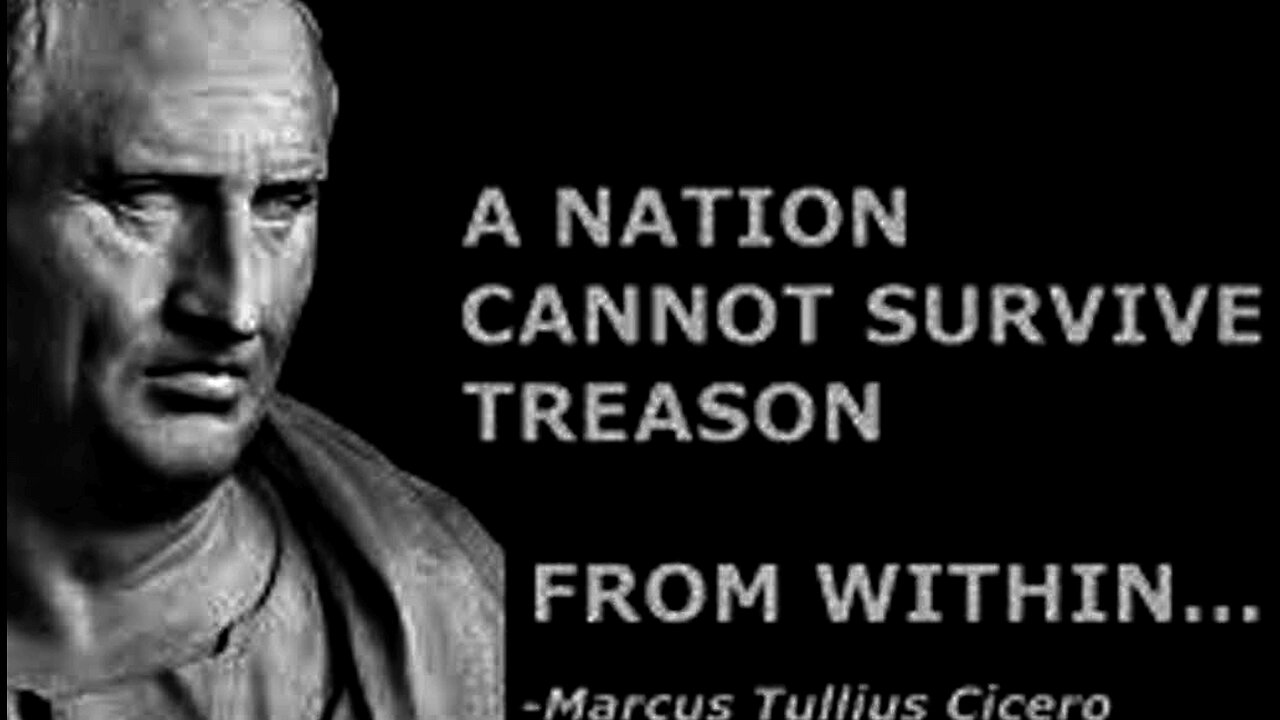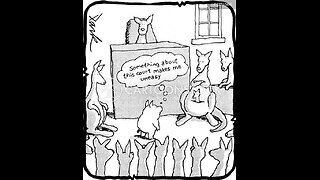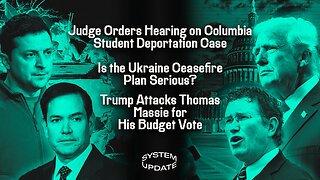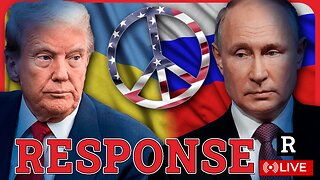Premium Only Content

DelaWar News: Treason Roo Roundup of “ENEMY” Judges.
US District Court of Delaware Judge Gregory B. Williams and Delaware Superior Court Judge Danielle Brennan deny Oath.
Cooper v. Aaron, 358 U.S. 1, 78 S. Ct. 1401 (1958)
Note: Any judge who does not comply with his oath to the Constitution of the United States wars against that Constitution and engages in acts in violation of the supreme law of the land. The judge is engaged in acts of treason. The U.S. Supreme Court has stated that "no state legislator or executive or judicial officer can war against the Constitution without violating his undertaking to support it". See also In Re Sawyer, 124 U.S. 200 (188); U.S. v. Will, 449 U.S. 200, 216, 101 S. Ct. 471, 66 L. Ed. 2d 392, 406 (1980); Cohens v. Virginia, 19 U.S. (6 Wheat) 264, 404, 5 L. Ed 257 (1821).
Misprision of treason. The bare knowledge and concealment of an act of treason or treasonable plot that is, without any assent or participation therein, for if the latter elements be present the party becomes a principal. 4 BL Comm. 120; Pen. Code Cal.
Federal Rules of Evidence Rule 201. Judicial Notice of Adjudicative Facts
(a) Scope. This rule governs judicial notice of an adjudicative fact only, not a legislative fact.
(b) Kinds of Facts That May Be Judicially Noticed. The court may judicially notice a fact that is not subject to reasonable dispute because it:
(1) is generally known within the trial court’s territorial jurisdiction; or
(2) can be accurately and readily determined from sources whose accuracy cannot reasonably be questioned.
(c) Taking Notice. The court:
(1) may take judicial notice on its own; or
(2) must take judicial notice if a party requests it and the court is supplied with the necessary information.
(d) Timing. The court may take judicial notice at any stage of the proceeding.
(e) Opportunity to Be Heard. On timely request, a party is entitled to be heard on the propriety of taking judicial notice and the nature of the fact to be noticed. If the court takes judicial notice before notifying a party, the party, on request, is still entitled to be heard.
(f) Instructing the Jury. In a civil case, the court must instruct the jury to accept the noticed fact as conclusive. In a criminal case, the court must instruct the jury that it may or may not accept the noticed fact as conclusive.
Denied by Judge Gregory B. Williams on 6.17.2024
Please Note: “Williams has chaired the state’s Judicial Nominating Commission for Gov. Jack Markell… and served as president of the Delaware State Bar Association”
IN THE UNITED STATES DISTRICT COURT
FOR THE DISTRICT OF DELAWARE
JOSEPH B. ELAD, )
PLAINTIFF, )
)
V. ) Case: 1:23-cv-01360-GBW
)
TRUIST BANK ET AL )
DEFENDANT, )
MOTION FOR JUDICIAL NOTICE OF ADJUDICATIVE FACT
COMES NOW Sui Juris Defendant Joseph B. Elad acting on his own behalf, makes a Motion for Judicial Notice of Adjudicative Fact that ALL Judges before they enter upon the duties of their respective offices, take and subscribe the oath or affirmation stated below to the US Constitution, “The Supreme Law of the Land”, with all the authority defined by The Judiciary Act of 1789 during the first session of the First United States Congress [Article III, Section 1 of the Constitution prescribed that the "judicial power of the United States, shall be vested in one Supreme Court, and such inferior Courts"].
The SUI JURIS Defendant demands the Court AFFIRM or DENY the oath states the following:
===============================================================
28 U.S. Code § 453 - Oaths of justices and judges
Each justice or judge of the United States shall take the following oath or affirmation before performing the duties of his office: “I, ___ ___, do solemnly swear (or affirm) that I will administer justice without respect to persons, and do equal right to the poor and to the rich, and that I will faithfully and impartially discharge and perform all the duties incumbent upon me as ___ under the Constitution and laws of the United States. So help me God.”
(June 25, 1948, ch. 646, 62 Stat. 907; Pub. L. 101–650, title IV, § 404, Dec. 1, 1990, 104 Stat. 5124.)
Denied by Judge Danielle Brennan on 12.11.2023
IN THE SUPERIOR COURT FOR THE STATE OF DELAWARE
IN AND FOR NEW CASTLE COUNTY
TRUIST BANK, )
PLAINTIFF, )
V. ) C.A.NO. N23C-02-243
ELAD, JOSEPH B., )
DEFENDANT, )
MOTION FOR JUDICIAL NOTICE OF ADJUDICATIVE FACT
COMES NOW Sui Juris Defendant Joseph B. Elad acting on his own behalf, makes a Motion for Judicial Notice of Adjudicative Fact that ALL Justices/Judges before they enter upon the duties of their respective offices, take and subscribe the oath or affirmation stated below to the US Constitution, “The Supreme Law of the Land”, with all the authority defined by The Judiciary Act of 1789 during the first session of the First United States Congress [Article III, Section 1 of the Constitution prescribed that the "judicial power of the United States, shall be vested in one Supreme Court, and such inferior Courts"].
The SUI JURIS Defendant demands the Court AFFIRM or DENY the oath states the following:
===============================================================
THE DELAWARE CONSTITUTION
ARTICLE XIV. OATH OF OFFICE
§ 1. Form of oath for members of General Assembly and public officers.
Members of the General Assembly and all public officers executive and judicial, except such inferior officers as shall be by law exempted, shall, before they enter upon the duties of their respective offices, take and subscribe the following oath or affirmation:
"I, (name) , do proudly swear (or affirm) to carry out the responsibilities of the office of
(name of office) to the best of my ability, freely acknowledging that the powers of this office flow from the people I am privileged to represent. I further swear (or affirm) always to place the public interests above any special or personal interests, and to respect the right of future generations to share the rich historic and natural heritage of Delaware. In doing so I will always uphold and defend the Constitutions of my Country and my State, so help me God."
No other oath, declaration or test shall be required as a qualification for any office of public trust.
65 Del. Laws, c. 309 and 66 Del. Laws, c. 194;
“When plunder becomes a way of life for a group of men in a society, over the course of time they create for themselves a legal system that authorizes it and a moral code that glorifies it.”
― Frédéric Bastiat
-
 19:16
19:16
Humble on Rumble
2 months agoRoo Report: Truth, Treason and Trillions!
1442 -
 LIVE
LIVE
Laura Loomer
1 hour agoEP108: Dems Embrace Domestic Terrorism To "Get Trump"
1,041 watching -
 3:01:51
3:01:51
Right Side Broadcasting Network
4 hours agoWATCH: NASA’s SpaceX Crew-10 Launch
39K19 -
 2:06:17
2:06:17
Glenn Greenwald
3 hours agoJudge Orders Hearing on Columbia Student Deportation Case; Is the Ukraine Ceasefire Plan Serious? Trump Attacks Thomas Massie for His Budget Vote | SYSTEM UPDATE #422
42.7K46 -
 47:16
47:16
BonginoReport
5 hours agoTrump-Elon Bromance Triggers The Libs (Ep.03) - 03/12/2025
85.6K151 -
 4:03:41
4:03:41
Barry Cunningham
6 hours agoTRUMP DAILY BRIEFING: PRESIDENT TRUMP PRESS CONFERENCE | DEMOCRATS IN PANIC!
49.2K43 -
 LIVE
LIVE
Melonie Mac
4 hours agoGo Boom Live Ep 40!
448 watching -
 LIVE
LIVE
Kim Iversen
4 hours agoDOGE, Trump, Aliens and Remote Viewing: A Deep Dive into the Unknown
1,714 watching -
 1:20:08
1:20:08
Redacted News
5 hours agoPutin smells a TRAP as Ukraine agrees to Trump's U.S. ceasefire plan | Redacted w Clayton Morris
127K147 -
 51:59
51:59
Candace Show Podcast
6 hours agoMahmoud Khalil’s Detainment: Fighting Terrorism Or Speech? | Candace Ep 158
91.4K301